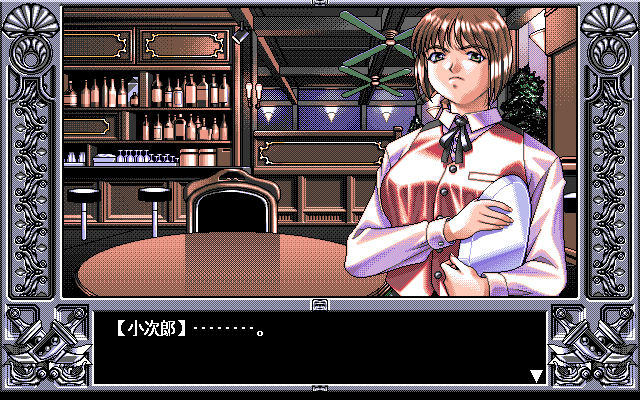Last updated on August 13, 2013
To Eroge or Not Eroge
The term eroge (short for “erotic game”) refers to a specific, niche subset of visual novels that have a significant fan-base and following in Japan and other east Asian countries. Though pornography as an industry thrives in the West, erotic content in a text-driven narrative with hand-drawn or CG animated characters is all but unknown in North America.
Being an American, I am only tangentially acquainted with eroge. I’ve never played a visual novel with erotic content (chiefly for personal moral reasons). I, however, played roughly ten visual novels with mechanics similar to eroge visual novels: that is, the opportunity to forge one or more romantic relationships with other characters in the game. The RPG series Ar tonelico, the Otome title Hakuoki, Christine Love’s “Analogue: A Hate Story,” and other titles have given me some insight into the nature and culture of this type of game.
Whether the content of the game is sexually explicit or implicit, whether it’s tasteless or tasteful, the fact remains that there are hundreds of games where the goal is to woo another person, or perhaps more than one person, for either a one-night stand or a committed relationship of some kind. As varied as modern romantic/sexual relationships are in reality, so they are (and more) in the realm of fantasy. For example, in “Song of Saya,” the protagonist (a hospitalized male) falls in love with an alien who appears as a demure, beautiful woman in the hallucinated dreamscape she forces him to enter, but who is monstrous and terrifying in reality.

Exceptions aside, however, the vast majority of these games cater to the (so far) consistent target market of hormone-driven teenage males. In these games, you play a male protagonist, and you can chase after one or more ladies in your quest to … do whatever it is you want to do.
We’ll come back to these games … but before we do, a little history about my past academic pursuits.
Polygamy and the World Christian Movement
I wrote my undergrad thesis (for a major in Anthropology) on polygamy (specifically polygyny — one husband, multiple wives) in the Independent African Church movement. Basically, when Western missionaries brought the Gospel to indigenous African tribes and communities, they brought with it the entire worldview, the “in” social mores, and all biblical interpretation associated with this or that denomination. The British brought the Anglican church; in the 19th and 20th centuries, American Wesleyan / Methodist churches dominated much of the Central African missions movement.
As people (and generally, whole communities) chose to convert, it created a unique situation for the wealthy males (often village leaders) with multiple wives. Some missionaries would claim that only the first marriage was valid, and the others needed to be cast out — those rejected women would become something worse than widows, and were sometimes accused of witchcraft (a common scapegoat for cast-out women in Africa, especially for those where there was already a belief in witchcraft prior to the entry of the Gospel). Some men wouldn’t keep their first wife, but instead their favorite, or youngest wife.
But still others had a different solution. They had the spiritual leadership of these missionaries, but they also had the Bible itself. And they read it, and they saw that while a picture of heterosexual monogamy may appear the ideal (in Genesis 2, and in all the metaphors about Christ and Church, and in Paul’s Haustafel passages), there were instances dotting the Old Testament where polygamy was practiced and never condemned (only in cases where the additional wives brought with them their idols and worship of false gods were David, Solomon and others chided). And so these African men took their own interpretation, said “hey, polygamy is okay,” and created their own segment of Christianity that accepted polygamy.
That’s the baseline history. There is plenty more after that, and from one village or tribe or city to the next you’ll find a host of different churches with different sets of beliefs and rules around marriage. But I say all this to remind the reader that “one man, one woman” isn’t explicitly defined as the only kind of valid marriage in Scripture itself, even if it does rise to the top as the “ideal” relationship.
Sexual Achievement(s)
Remember when Jasmine declares “I am not a prize to be won!” in the 1992 Disney film Aladdin? That was the first time my young, impressionable mind was awakened to the concept of, and refutation to, the objectification of women.
In these romance-centric visual novels, and especially in eroge, it would seem that you are the subject, and the target women are the objects. They are prizes to be won. Unlocking their “CG art,” or achieving special scenarios that allow you to “encounter” more than one woman, are all highly sought after by the player. And the game developers feed into this paradigm year after year, one game after the next. One European developer who played into this is CD Projekt RED with “The Witcher” series (though I’m told the excess number of sexual encounters, and thus the “art” to be collected, is reduced in the second game). But in Japan, this is huge. This is *the point* of the game.
And if that’s the point, why limit oneself to one relationship?
This is the thing I find interesting. While there are certainly games that allow these “harem” scenarios where you’re just hopping in the sack with every attractive female in the game, many Japanese visual novels, oft-described as “love adventures,” enforce a rule of exclusivity. And, should you try to “play the field,” you may find yourself at the end of the game with no one. A reflection of society’s rules? Perhaps. But, perhaps, the gamer finds it somehow more satisfying to commit oneself to the relationship.
By this point, it’s a trope. Lurk the right areas of 4chan sometime and you’ll find half- or wholly-genuine statements about a particular character in a particular game being the “waifu” (Romaji for “wife”) and “all the feels” etc etc. The 4chan-inspired erotic visual novel “Katawa Shoujo” (you’re a male with a heart problem attending a special-needs school, and your possible mates include a blind girl, a deaf girl, a girl with no legs, a girl with scar tissue across half her face, and more) brought out more than the usual crass male “must ejaculate on everything” sentiments. It brought out “all the feels.” People got into this game. They fell in love with this virtual girl. They refused to play through the game again to establish relationships with other girls. That’s nuts.
Almost as nuts as that Japanese guy that held a wedding ceremony and considers himself married to Nene, a girl from the game Love Plus.
Waifu > Achievement
This is all anecdotal. I don’t have numbers. I just have the forum posts, ads, and other Internet chatter to base my conjecture on. But my argument is this: even in a presumably amoral virtual environment where anything goes, people still find themselves wanting a facsimile of reality’s “good life.” Sure, there are exceptions, and they are loudly noted (such as … and I’m not even going to link to it … the truly offensive “Rape-Lay”). But, like the Scriptural “rising to the top” ideal of one-man one-woman, even in these virtual realms we see fidelity and monogamy raised up, and the harem scenarios de-valued as a fun but hollow experience.
And while I’m sure there are eroge players who would reject my assertion outright (especially those who ascribe to polyamory in real life), I’ll leave it to each individual to consider my assertion: even in a post-modern society and virtual worlds where all possibilities exist, a romantic “I-thou” — the player and one committed partner — remains the standard against which all other romantic encounters are tried and found wanting.


